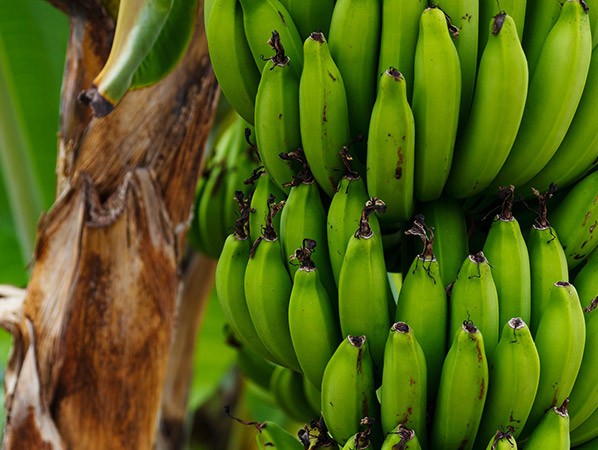
Researchers at Wageningen University & Research are harvesting the first 'Nederbananen' ('Dutch Bananas') this week. Boerenhart will offer the bananas as a 'regional product' to restaurants and hospitals in the region. The cultivation took place on two types of substrate: the peaty coco peat, and rockwool in which an aggressive fungus does not establish.
Since January, a unique research experiment has been carried out in the greenhouses of the Unifarm trial farm in Wageningen. Bananas are grown in the greenhouse in pots and on substrate, an artificial soil for plant growth. "For the 100th anniversary of WUR we came up with this plan: growing a regional banana in the greenhouses of Wageningen," says Professor of Tropical Plant Disease Gert Kema. "We did that together with Boerenhart". Boerenhart is a cooperation of local producers from the Gelderse Vallei who want to do business in a sustainable and socially responsible way. "With this experiment we investigate whether this crop offers perspectives for further research into the control of panama disease. This disease threatens bananas elsewhere in the world and is a major threat to cultivation there. So we removed the banana from the soil.
The experiment proved to be very successful, says Prof. Kema. "The banana plants grow excellently on cocoa peate and rockwool substrate with only a nutrient solution. The advantage of substrate cultivation is that nutrients can be more effectively adjusted to the needs. Moreover, you prevent losses, possibly around 30%, by leakage. The 'Nederbanaan' also does not need disease prevention, making the cultivation more sustainable than in traditional production areas.
There are sixty plants in the greenhouse, but worldwide the banana acreage is hundreds of thousands of hectares. "We have learned that the plant density is too high at the moment. We are going to adjust this so that we have more light and the bunches ripen faster," says Prof. Kema.
A few partners within the Nederbananen project - Wageningen University & Research, Boerenhart, Triple20, Keygene and Chiquita - are interested in continuing this way of growing in greenhouses or other buildings in order to serve a small regional market. "Think of consumers or restaurants and hospitals in the region. In this way we can also start growing other varieties for a more diverse offer. In addition, we are planning a trial in the Philippines to find out how precision cultivation works under ideal conditions.
The bananas in the greenhouses in Wageningen are now so far that they can be harvested. Then they go to a ripening installation of Chiquita. "We are on our way to developing a sustainable banana cultivation with various bananas that are resistant to diseases and that are grown in a healthy soil in a responsible social climate," says Kema.
Source: Beeld ©Pixabay, Tekst: @WUR